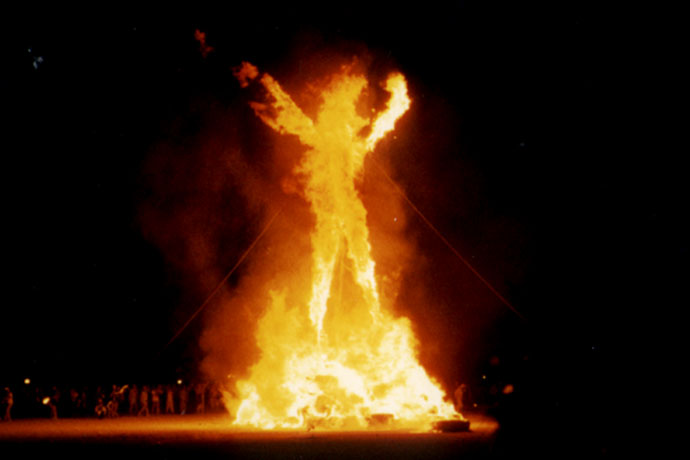Lifestyle
Shoes, bags, even dentures lost at Burning Man await owners

FILE: Light matter, Burning Man 2004 (Photo By Aaron Logan, CC BY 2.0)
RENO, Nev. — Lindsay Weiss once lost her cellphone and got it back, so she and a friend knew what they had to do when they discovered a camera during the Burning Man festival in the Nevada desert — even though it meant giving up their coveted shady seat for a musical performance.
The friends snapped a quick selfie and took the device to lost-and-found, so the owner could claim it and the pair could “forever be a part of their journey,” Weiss said.
“Losing something out there on the playa makes its mark on your trip,” she said of the sprawling counterculture gathering. “Kinda makes you feel like a loser.”
Cameras and IDs are among the more common belongings that end up at lost-and-found after the event this summer billed as North America’s largest outdoor arts festival. Other items left behind in the dusty, 5-square-mile (13-square-kilometre) encampment include shoes, keys, stuffed animals — even dentures.
Still missing are a marching-band hat with gold mirror tiles, a furry cheetah vest, a headdress with horns and a chainmail loincloth skirt.
“As of mid-November, we’ve recovered 2,479 items and returned 1,279,” said Terry Schoop, who helps oversee the recovery operation at Burning Man’s San Francisco headquarters. “We have about a 60 per cent return rate.”
Not bad for a temporary community of 60,000 artists, free spirits, old hippies and young thrill seekers who descend on a dried-up lake bed in the Black Rock Desert for an adventure combining wilderness camping with avant-garde performance 120 miles (193 kilometres) north of Reno.
The usual suspects top this year’s list of most frequently lost in the land of drum circles and psychedelic art cars: 582 cellphones, 570 backpacks or bags, and 529 drivers’ licenses, passports or other forms of identification.
Unclaimed items are listed on Burning Man’s website with photos and numbers. They include more than 200 shirts, 100 jackets, 80 hydration backpacks, 50 pairs of eyeglasses, six suitcases and several dozen water bottles.
“Your item may look different after rolling in the dust,” the website advises.
It links to an online forum that has brief descriptions of found items: a “big bag of ladies clothes,” a piano tuning kit, a “small stuffed cow with cowboy hat” and one black Dr. Martens combat boot.
Other articles lost-but-not-yet-found include a wedding ring, a flute, “fire nunchucks,” a stuffed bunny — “daughter’s since birth,” and a “dark-leafy-print bandanna lost on the playa somewhere around the giant flamingo.”
The high rate of return doesn’t surprise Mike Kivett, manager of a company that has provided portable toilets and trailers at Burning Man since 2003. He remembers when his co-worker dismissed his suggestion to check the lost-and-found for his missing phone, saying the odds of recovering it were slim.
“I told him there’s a good vibe out here,” Kivett said. “If somebody finds it, they’re going to return it because they know what it’s like to lose something out here — a sense of obligation, duty to fellow man.”
Ninety minutes later, the co-worker had his phone back.
Burning Man has been collecting and returning items since the event moved to Nevada in 1992 from San Francisco, where it began in 1986 with about 20 people burning a wooden effigy in a celebration of art.
The event’s technology team has developed a sophisticated database people can search onsite at a Wi-Fi centre. Afterward, volunteers scour the web and emails.
Most institutions donate lost items to charity if they aren’t claimed in about a month. Burning Man does that too — just not as quickly, said Schoop, who helps oversee recovery. Volunteers concentrate first on IDs and cellphones.
“We spend about three or four months trying to hook people up with lost items,” he said.
His most unusual recovery?
“A partial pair of dentures,” Schoop said. “The man showed up, took them out of the bag they were in, popped them in his mouth and said, ‘See, I can prove it’s mine: It fits!”’
Some lost items carry hefty price tags, while others have more sentimental worth. Schoop remembers a cellphone returned to a woman who lost it shortly after her father died and her home burned down.
“She said the phone we gave back to her was the only record of any photographs she had of her father and, I think, some voicemails from him,” he said. “We thought we were just returning a phone, but it meant a lifetime to her.”





















